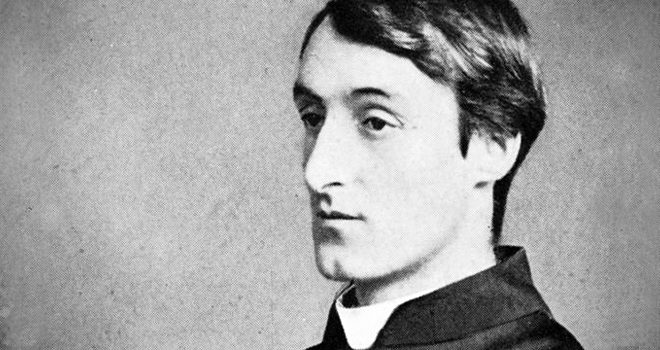By Gerard Manley Hopkins
Part 4 ( Verses 6 to 8 )
6.Not out of his bliss
Springs the stress felt
Nor first from heaven (and few know this)
Swings the stroke dealt—
Stroke and a stress that stars and storms deliver,
That guilt is hushed by, hearts are flushed by and melt—
But it rides time like riding a river
(And here the faithful waver, the faithless fable and miss).
“ Not”,(“ Not out of his bliss”). An unusual negative opening! What is the poet denying? He is moving in the poem from his personal encounters with God to general reflections on God’s ways. The usual feeling is that God sends the storms ( “stroke”) and we cannot make out why. This the poet is answering in the opening “ Not” , “ Not out of his bliss”). God is bliss, and he is not the cause of calamities. Not only God, but the heavens too are not the cause , “Nor first from heaven (and few know this)” . At such calamities, one’s faith is shaken, and the faithless build fables about the misfortunes , and miss the meaning, “ (And here the faithful waver, the faithless fable and miss).”
If the storm is not God-made nor heaven sent, (“Not out of his bliss… Nor first from heaven”) how does one understand it? One can never understand such a calamity, It is to be “felt” (“the stress felt”), not to be understood. The usual word magic of Hopkins is to be noticed here. “Springs the stress felt”. The stress, which in this case is the storm, “ Springs”! It is the same spring as in v.4 , “a vein /Of the gospel proffer, a pressure, a principle, Christ’s gift.” The stress in man’s life is to be “felt” as “Christ’s gift”. “Springs” in this verse is to be seen in conjunction with the “ vein” of earlier verse. So, the storm is at once the storm and the spring of Christ’s grace. The storms come to flush man of his guilt, and cleanse his heart, ( “That guilt is hushed by, hearts are flushed by and melt”). It is fire, but a purifying fire.
“Springs the stress” ,”Swings the stroke”: Stroke is the calamity, and Stress is the way the stroke is “instressed”, “felt”, or experienced.
But the question remains unanswered. Who caused the storm? “ It rides time like riding a river ”.Here, the poet brings in “time” to intervene.Calamities come riding the river of time. But what is time? Is it an operative agent of God? This is a tough question for any theology, and one that can have no answer.It has to be “felt”.Not only the faithless, but the faithful too will only have to” fable”. The Mahabharata has such a fable. It is called “ The Gautami-hunter-serpent-Death-
The crucial term in this verse, and in the entire poem, is “felt” ( “ Springs the stress felt” ). The deeds of God are beyond man’s understanding. The faithful and the faithless are alike helpless. The faithful “feel”, and the faithless “ fable”.
7.It dates from day
Of his going in Galilee;
Warm-laid grave of a womb-life grey;
Manger, maiden’s knee;
The dense and the driven Passion, and frightful sweat;
Thence the discharge of it, there its swelling to be,
Though felt before, though in high flood yet—
What none would have known of it, only the heart, being hard at bay,
The breaking in of God (of v.6 ), “It dates from day Of his going in Galilee ”: “It” refers to the “stress felt” in the previous verse. The stress was there before Christ’s incarnation. But it is felt, even among the Christians, only by those who have suffered as Christ did,( “ …Only the heart, being hard at bay”) . That is to say , only those who suffered would have known of it. Hopkins is emphasizing the life in death in Christ. His death in Heaven, and birth in the mortal world are suggested by a weaving of words in triple alliteration: “Warm-laid grave of a womb-life grey” ; (warm,womb; laid,life; grave,grey). This is weaving death (“Warm-laid grave”) and life (womb-life ) together. The manger is both Christ’s grave ( in heaven) and cradle in this world. The immaculate conception is suggested in “Manger, maiden’s knee”. However, Hopkins is not denying “it”, the mystical experience, to those before Christ, “ Though felt before”. Only those who suffered would have known it, “The dense and the driven Passion, and frightful sweat”. Passion is the Christian suffering. Without being driven by that passion, one doesn’t experience the instress. “Thence the discharge of it, there its swelling to be.” The “ discharge” and the “ swelling” in the immediate context are obviously a reference to the crucifixion, but they have a wider and more significant meaning. The “discharge” of Christ’s blood is indeed the recharge of the world. It reminds us of Hopkins’s famous poem “God’s Grandeur”: “The world is charged with the grandeur of God.” The “swelling” in this verse also echoes “It gathers to a greatness, like the ooze of oil” of the same sonnet . This discharge was felt even before Christ,but it is in great flood now, with the “discharge” and “ swelling”.Hopkins also anticipates Eliot’s The Little Gidding: “The dove descending breaks the air… the one discharge from sin error…”
8 Is out with it! Oh,
We lash with the best or worst
Word last! How a lush-kept plush-capped sloe
Will, mouthed to flesh-burst,
Gush!—flush the man, the being with it, sour or sweet,
Brim, in a flash, full!—Hither then, last or first,
To hero of Calvary, Christ’s feet—
Never ask if meaning it, wanting it, warned of it—men go.
This verse continues from the previous stanza, the ‘heart, hard at bay….’. The internal struggle is a twosome, the revelation of Christ as Word, and the expression of that revelation in words. The opening of the verse , ‘Is out with it ‘ is the “expression” in both the senses,to throw out and to find words for the struggle . The struggle of “the heart, being hard at bay” to express itself, to throw itself out to receive the revelation of the Word ,as well as the struggle to find words to express that unworldly experience, ‘best or worst Word’ .This verse begins with that expression, and an explosion, throwing itself out , ‘Is out with it’, a poet’s relief . This experience is compared to the bursting of a bitter-sweet sloe ( a wild plum) in one’s mouth. The sloe is bitter- sweet, once again symbolic of the dual aspect of God, compassion wrapped in wrath. The sloe that has not known the frost will retain its astringency. But if it had been exposed to frost ,it mellows, and when it bursts in the mouth it is like a flood of sweetness,like the wine that is Christ’s blood. The struggle with the expression of that divine experience is strange. For the tongue, with the plum-burst, cannot give it tongue, cannot speak of it. As in another verse he said, “truer than tongue confess”.
One must make do,”the best or worst /Word last”. “ In the beginning was the Word.” The “word last” is the word the poet finds ,”the best or worst” for the Word . In the language of the Indian school of Grammar of Sphotavada, there are four stages of the expression: Para,Pasyanti,Madhyama, and Vaikhari . The last, Vaikhari is the “Word last ”of Hopkins, the human language . The Word, Para is the first,(“ In the beginning was the Word.”)
The first experience of the breaking in of Christ as Word is expressed in sensual terms. The plum on one’s tongue bursting is the first taste of the divine grace.( The tongue is in full play here– lash,plush, last, lush.) Everyone experiences this grace, sooner or later , “last or first”, and once one has tasted the grace, men march “To hero of Calvary, Christ’s feet”. Some people experience a revelation, some convert, some with faith walk to the Calvary, “Never ask if meaning it, wanting it, warned of it—men go.”
Titbit:
“ I have never wavered in my vocation, but I have not lived up to it. I destroyed the verse I had written when I entered the Society and meant to write no more; The Deutschland I began after a long interval at the chance suggestionof my superior,but that being done it is a question whether I did well to write anything else.” ( Hopkins: Letter to Dixon.)
-continued









Add comment